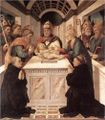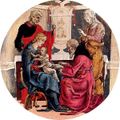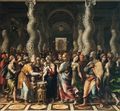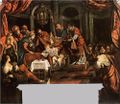Difference between revisions of "Category:Circumcision of Jesus (subject)"
| (3 intermediate revisions by the same user not shown) | |||
| Line 33: | Line 33: | ||
Luke 2:21 (NRSV) -- ''After eight days had passed, it was time to circumcise the child; and he was called Jesus, the name given by the angel before he was conceived in the womb.'' | Luke 2:21 (NRSV) -- ''After eight days had passed, it was time to circumcise the child; and he was called Jesus, the name given by the angel before he was conceived in the womb.'' | ||
==== Cf. [[Gospel of Barnabas]] ==== | |||
[5] When the eight days were fulfilled according to the law of the Lord, as it is written in the book of Moses, they took the child and carried him to the temple to circumcise him. And so they circumcised the child, and gave him the name Jesus, as the angel of the Lord had said before he was conceived in the womb. Mary and Joseph perceived that the child must needs be for the salvation and ruin of many. Wherefore they feared God, and kept the child with fear of God. | |||
==Circumcision of Jesus, in the arts== | ==Circumcision of Jesus, in the arts== | ||
| Line 41: | Line 45: | ||
<gallery> | <gallery> | ||
File:Circumcision Giotto.jpg|[[Circumcision of | File:Circumcision Jesus Giotto.jpg|[[Circumcision of Jesus (1306 Giotto), art]] | ||
File:Circumcision Angelico.jpg|[[Circumcision of Christ (1452 Angelico), art]] | File:Circumcision Angelico.jpg|[[Circumcision of Christ (1452 Angelico), art]] | ||
| Line 69: | Line 73: | ||
File:Circumcision Rizi.jpg|[[Circumcision of Christ (1673 Rizi), art]] | File:Circumcision Rizi.jpg|[[Circumcision of Christ (1673 Rizi), art]] | ||
File:Circumcision Viani.jpg|[[Circumcision of Christ (1690 Viani), art]] | File:Circumcision Viani.jpg|[[Circumcision of Christ (1690 Viani), art]] | ||
File:Circumcision Dirr.jpg|[[Circumcision of Christ (1867 Dirr), art]] | |||
</gallery> | </gallery> | ||
Latest revision as of 16:30, 25 August 2022
The Circumcision of Jesus refers to an episode in the life of Jesus of Nazareth, and his parents, Mary of Nazareth and Joseph of Nazareth. The episode is narrated only in the Gospel of Luke.
- Nativity of Jesus : Genealogy of Jesus -- Annunciation to Mary -- Annunciation to Joseph -- Visitation of Mary -- Birth of Jesus -- Adoration of the Shepherds -- Adoration of the Magi -- Circumcision of Jesus -- Presentation of Jesus at the Temple -- Massacre of the Innocents -- Flight into Egypt
< Life of Jesus : Nativity of Jesus -- Jesus' Hidden Years -- Ministry of Jesus (Parables of Jesus, Miracles of Jesus) -- Passion of Jesus -- Resurrection of Jesus -- Relics of Jesus >
< Life of Mary of Nazareth : Expulsion of Joachim from the Temple -- Annunciation to Anne and Joachim -- Birth of Mary -- Girlhood of Mary (Education of the Virgin, Presentation of Mary at the Temple) -- Marriage of Mary and Joseph -- Annunciation to Mary -- Visitation of Mary -- Birth of Jesus -- Adoration of the Shepherds -- Adoration of the Magi -- Circumcision of Jesus -- Presentation of Jesus at the Temple -- Massacre of the Innocents -- Flight into Egypt -- Jesus among the Doctors -- Death of Joseph of Nazareth -- Wedding at Cana -- Jesus' True Relatives -- Hometown Rejection -- Crucifixion of Jesus -- Resurrection of Jesus -- Ascension of Jesus -- Gathering of the Twelve at Jerusalem -- Christian Pentecost -- Death and Assumption of Mary -- Relics of Mary of Nazareth >
Overview
One verse in the Gospel of Luke is all we have about the event. Jesus was circumcised the eighth day after his birth and his name was imposed on him. This was in accordance to the Law of Moses (Lev.12:3). No further details are provided.
That Jesus was circumcised is virtually certain from the historical point of view, even though nothing can be said about the circumstances of the event. If not circumcised, Jesus could not have performed the rituals of the Temple and should not have been bound to the obligations of the Mosaic Torah. The very fact that later Christian tradition tried to reinterpret the event as a sort of prophecy of the Passion--the first time that the blood of Jesus was shed at the hands of "the Jews"--shows that its memory still created embarrassment within a community that no longer required the ritual.
Later Christian tradition
Christian liturgy celebrates the Feast of the Circumcision of Jesus, which overlaps with the Feast of the Holy Name of Jesus.
In the Middle Ages there were as many as 18 churches claiming possession of the relic of the Holy Prepuce of Jesus: in Italy, France, Germany, Belgium, etc. At that time, reliquaries containing bodily parts of Jesus could be actually commonly found in Europe.
Most of these relics were lost or destroyed during the Reformation or the French Revolution. The authorities of the Roman Catholic Church also began looking with greater and greater skepticism to these relics, as all of them were of very dubious provenance (to say the least). The cult of bodily parts of Jesus (including the Holy Prepuce) was discouraged and gradually felt into oblivion.
The last recorded occurrence of such a cult was in the Italian village of Calcata, Viterbo (near Rome), where the relic of the Holy Prepuce of Jesus was still paraded in the streets as recently as 1983. The practice ended, however, when thieves stole the jewel-encrusted case, contents and all.
Circumcision of Jesus, in ancient sources
Gospel of Luke
Luke 2:21 (NRSV) -- After eight days had passed, it was time to circumcise the child; and he was called Jesus, the name given by the angel before he was conceived in the womb.
Cf. Gospel of Barnabas
[5] When the eight days were fulfilled according to the law of the Lord, as it is written in the book of Moses, they took the child and carried him to the temple to circumcise him. And so they circumcised the child, and gave him the name Jesus, as the angel of the Lord had said before he was conceived in the womb. Mary and Joseph perceived that the child must needs be for the salvation and ruin of many. Wherefore they feared God, and kept the child with fear of God.
Circumcision of Jesus, in the arts
The circumcision of Jesus was not an episode frequently visited in Christian iconography, where it overlapped with the more popular (and less controversial) Presentation of Jesus at the Temple. Besides, a correct depiction of the event would have required some familiarity with the Jewish ritual, which the rigid rules of separation between Christians and Jews made not easy to acquire. As a result, the iconography of the circumcision of Jesus often renounced any realism to stress its theological reinterpretation. The scene often ended to be more similar to a gruesome Passion scene (or to a Blood libel scene), than to the actual Jewish ritual.
- Circumcision Herlin.jpg
- Circumcision Pacher.jpg
- Circumcision Marziale.jpg
- Circumcision Jesus Schaufelein.jpg
- Circumcision Garofalo.jpg
- Circumcision Mazzolino.jpg
- Circumcision Monogram.jpeg
- Circumcision Carbajal.jpg
- Circumcision Coxcie.jpg
- Circumcision Barocci.jpg
- Circumcision Rizi.jpg
- Circumcision Viani.jpg
Circumcision of Jesus, in the movies
- Jesus Film Zeffirelli.jpg
Related categories
- Jesus of Nazareth / Nativity of Jesus / Presentation of Jesus at the Temple
- Mary of Nazareth / Joseph of Nazareth
- Gospel of Luke
External links
Pages in category "Circumcision of Jesus (subject)"
The following 17 pages are in this category, out of 17 total.
1
- Circumcision of Jesus (1306 Giotto), art
- Circumcision of Christ (1452 Angelico), art
- Circumcision of Christ (1461 Mantegna), art
- Circumcision of Christ (1465 Lippi), art
- Circumcision of Christ (1474 Tura), art
- Circumcision of Christ (1491 Signorelli), art
- Circumcision of Jesus (1503 Albertinelli), art
- Circumcision of Jesus (1520 Romano), art
- Circumcision of Christ (1523 Parmigianino), art
- Circumcision of Jesus (1558 Agresti), art
- Circumcision of Christ (1587 Tintoretto), art
- Circumcision of Christ (1605 Rubens), art
- Circumcision of Christ (1650 Bramer), art
- In circumcisione Domini (1683 Charpentier), oratorio
- La circoncisione del santo bambino Gesù (1729 Chiocchetti), oratorio
- Circumcision of Christ (1867 Dirr), art













